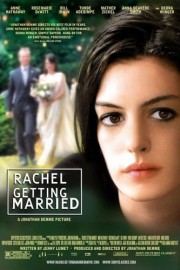Rachel Getting Married
This film should not be uplifting. Its drama is palpable and the emotional tension coils to the breaking point. But working from Jenny Lumet’s insightful screenplay has inspired the humanist in Jonathan Demme, who after two remakes of limited success (“The Truth About Charlie,” “The Manchurian Candidate”) and an overbearing tone poem a decade ago (“Beloved,” debatably his most polarizing film) has returned to the raw humanism that resonated in his duel Oscar-winners “Philadelphia” and “The Silence of the Lambs.”
The story is pretty straight forward. Kym (Anne Hathaway) has just gotten out of rehab after nine months. Now she’s clean and sober after spending much of the past several years addicted to drugs and drink. When she was 16, she accidentally drove her and her little brother off a bridge; she made it- her brother didn’t. That’s just one of the old wounds that get opened up as Kym goes straight from rehab into the maelstrom of her sister Rachel’s wedding. Starting with the rehearsal dinner that night, emotions are running high as Kym finds assimilating into both her biological family- be it bride-to-be Rachel (the feisty and vibrant Rosemarie DeWitt, whose stress level goes through the roof), overbearing father Paul (Bill Irwin, whose maneuvering between both sisters illuminates misunderstood conflicts), or estranged mother (Debra Winger, who makes an indelible impression in a few scant scenes)- while also meeting Rachel’s fiance Sydney (Tunde Adebimpe) and his family. It helps that the best man Kieran (Mather Zickel) also trying to stay clean, but circumstances erupt and the winds rush as viscerally as the storm that threatens to wash-out the outdoor wedding.
Demme’s approach to the material is intimate and up-close. He uses a handheld camera to take us in close to the situations and put us in the middle of the drama. It’s an effective approach not many directors can pull off, but it’s one that suits the filmmaker beautifully. He’s an actors director, looking for every nuance and wringing every feeling out of them until we’re not thinking about actors playing parts, but just watching people. Like everyone else, we’re being forced to watch Kym in the pain and poignancy of trying to change herself, and make amends for her past.
“God, give us grace to accept with serenity the things that cannot be changed, courage to change the things that should be changed, and the wisdom to distinguish the one from the other.”
That is the Serenity Prayer, which is said at one of the group sessions Kym and Kieran go to. Not that I’ve ever needed to say it myself (although I’ve felt myself in deep need for some direction many times this year), but I quote it because it gets to the heart of what this film is about. While we may feel more like Kym’s family when she seems to get into one of her self-righteous modes of thinking, we ultimately find ourselves with a great deal of sympathy for Kym herself, as scenes of her lighting a floating candle (which she sends off in the family pool), telling the story of her brother’s death at rehab, and watching her get cleaned up and ready to be her sister’s Maid of Honor give us insight into the character’s troubled psychological battle. Hathaway has never been better- she presents Kym as an unstoppable force fighting against the immovable object of her past, her family, and her feelings for both. The fight ends in a draw by weekend’s end, but as Kym drives off with a friend from rehab and Rachel sits as a married woman, listening to the music in the background, Demme gives us a sense of better days ahead after the storm that just passed this family by. Few filmmakers could pull such a thing off without going all 12-step, after-school-special on us. Demme proves himself a master of it.










